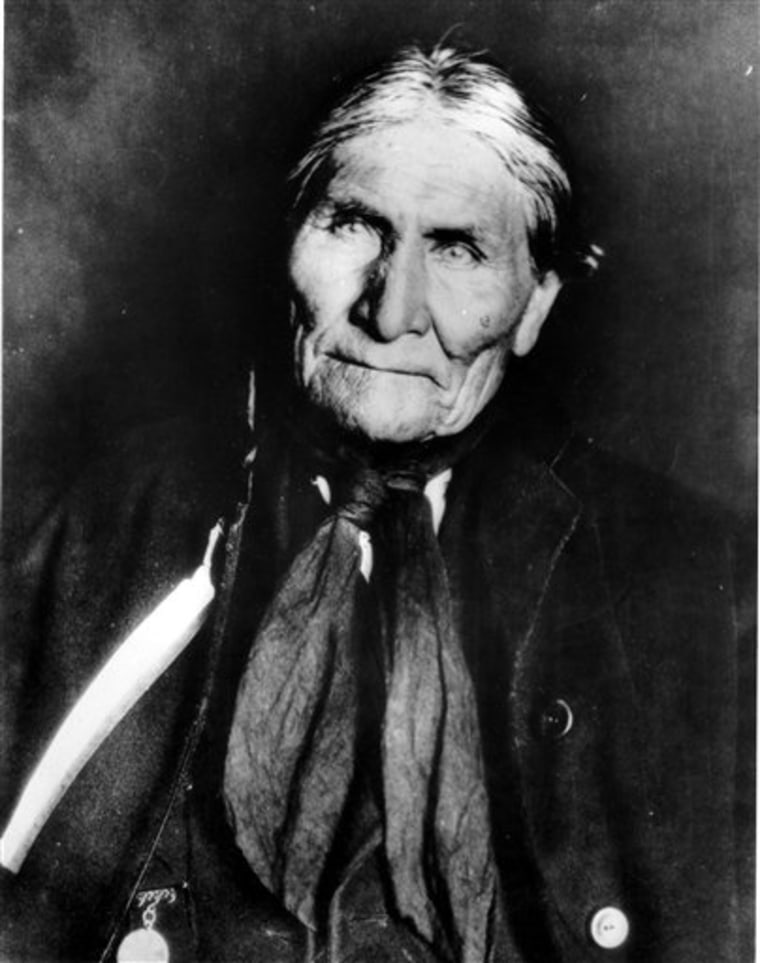Native Americans are objecting to the U.S. military's use of the code name "Geronimo" for Osama bin Laden during the raid that killed the al-Qaida leader.
After bin Laden was killed, the military sent a message back to the White House: "Geronimo EKIA" — enemy killed in action.
News about the code name spread quickly across Indian Country and on social network sites, resulting in a groundswell of criticism against the government. Several tribes and tribal leaders issued statements of disapproval, while many Facebook and Twitter posted angry comments, some using historical photos of the Apache leader for their profile pictures.
Geronimo is a legend among Apaches and other Indian tribes for the fierce fighting he brought on during the 19th century as he tried to protect his land, his people and their way of life from encroachment by U.S. and Mexican armies.
The leader of the Fort Sill Apache Tribe is among those looking for a formal apology from President Barack Obama.
Tribal Chairman Jeff Houser asked for the apology in a letter sent Tuesday to the president, saying his tribe was ecstatic to learn about bin Laden's death but those feelings were tempered when members learned that the code word used for the terrorist was the name of one of the Oklahoma tribe's legendary warriors.
"Unlike the coward Osama bin Laden, Geronimo faced his enemy in numerous battles and engagements," Houser wrote. "He is perhaps one of the greatest symbols of Native American resistance in the history of the United States."
Houser said equating Geronimo or any other Native American figure with a "mass murderer and cowardly terrorist" was painful and offensive.
"Right now Native American children all over this country are facing the reality of having one of their most revered figures being connected to a terrorist and murderer of thousands of innocent Americans," Houser wrote. "Think about how they feel at this point."
"Think of the outcry if they had used any other ethnic group's hero," added the Onondaga Council of Chiefs in a statement cited by the Syracuse Post-Standard. "Geronimo bravely and heroically defended his homeland and his people, eventually surrendering and living out the rest of his days peacefully, if in captivity."
As Geronimo is "arguably the most recognized Native American name in the world," the link "only serves to perpetuate negative stereotypes about our people," the statement said.
The nation's spiritual leader, Tadodaho Sid Hill, told the newspaper that he found it incomprehensible that they used a man viewed as a hero "to identify a man like Osama Bin Laden."
Hill told the Post-Standard he expected more from Obama, but that "nobody seems to be able to see our side."
The White House referred questions on the matter to the U.S. Defense Department, which said no disrespect was meant to Native Americans.
The department wouldn't elaborate on the use of "Geronimo," but said code names typically are chosen randomly so that those working on a mission can communicate without divulging any information to adversaries.
'Inappropriate uses' of 'icons'
Loretta Tuell, staff director and chief counsel for the Senate Indian Affairs Committee, said Tuesday it was inappropriate to link Geronimo, whom she called "one of the greatest Native American heroes," with one of the most hated enemies of the United States.
"These inappropriate uses of Native American icons and cultures are prevalent throughout our society, and the impacts to Native and non-Native children are devastating," Tuell said.
Tuell is a member of the Nez Perce tribe and grew on the tribe's reservation in Idaho. The Senate Indian Affairs panel had previously scheduled a hearing for Thursday on racial stereotypes of native people. Tuell said the use of Geronimo in the bin Laden raid will be discussed.
Steven Newcomb, a columnist for the weekly newspaper Indian Country Today, criticized what he called a disrespectful use of a name revered by many Native Americans.
"Apparently, having an African-American president in the White House is not enough to overturn the more than 200-year American tradition of treating and thinking of Indians as enemies of the United States," Newcomb wrote.
"It's another attempt to label Native Americans as terrorists," said Paula Antoine of the Rosebud Sioux Tribe in South Dakota.
Jefferson Keel, president of National Congress of American Indians, the largest organization representing American Indians and Alaska Natives, said, "Osama bin Laden was a shared enemy."
Keel said that since 2001, 77 American Indians and Alaskan Natives have died defending the U.S. in Afghanistan and Iraq. More than 400 have been wounded.
Geronimo was born in 1829 in what would later become the state of New Mexico. Aside from leading resistance efforts for his people, he was also known as a spiritual leader.
After the families of Geronimo and other Apache warriors were captured and sent to Florida, he and 35 warriors surrendered to Gen. Nelson A. Miles near the Arizona-New Mexico border in 1886.
Geronimo eventually was sent to Fort Sill in Oklahoma, where he died of pneumonia in 1909 after nearly 23 years of captivity. He was buried in the Fort Sill Apache prisoner of war cemetery.
